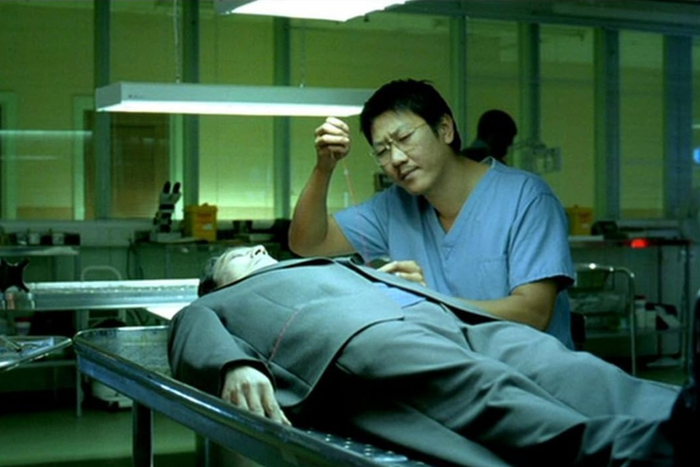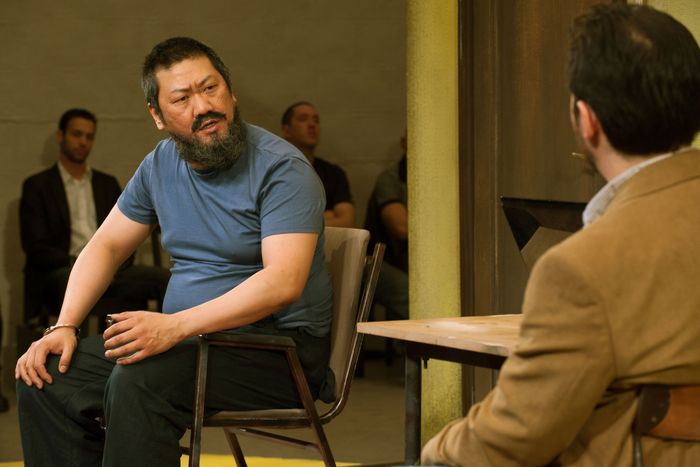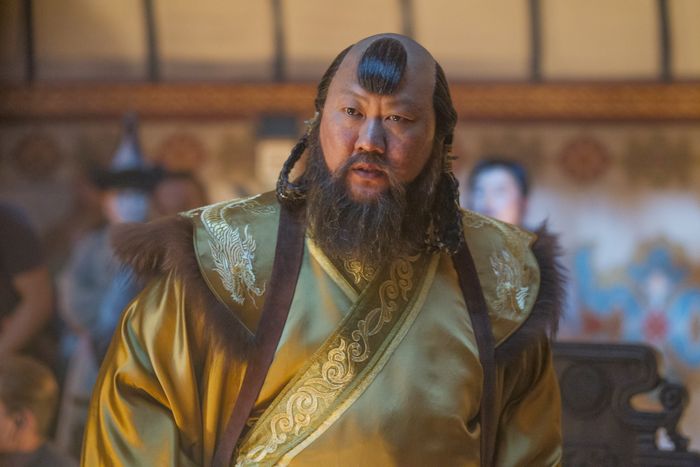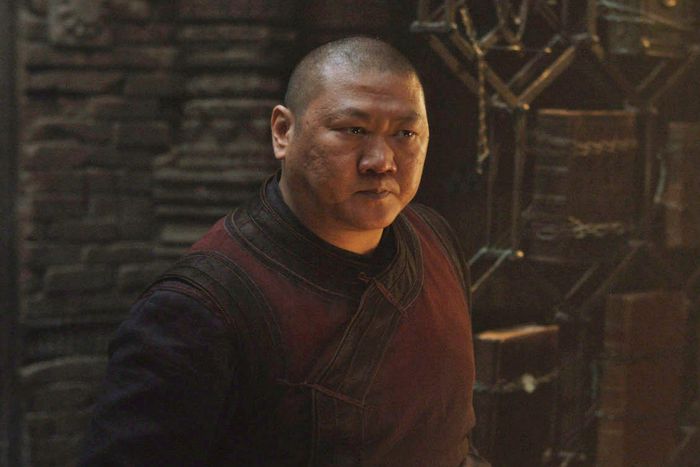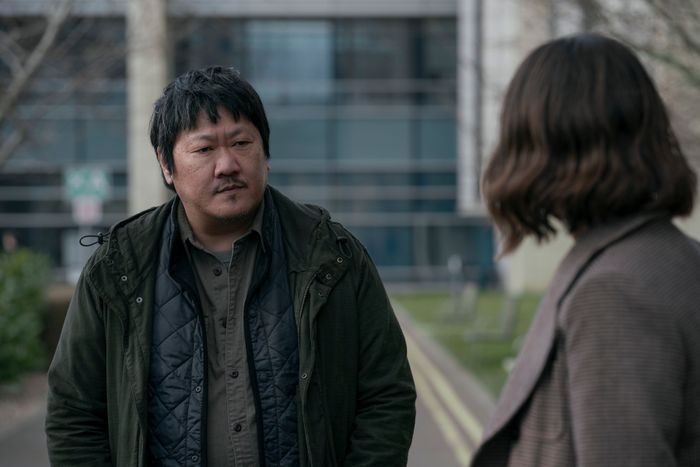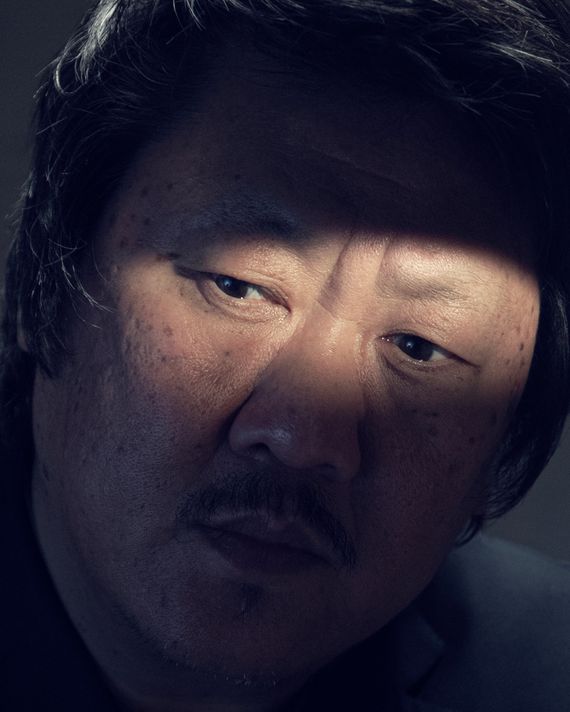
A list of things that describe Benedict Wong: thespian, raconteur, son of the Greater Manchester city of Salford, child of immigrants from Hong Kong, devout Man United supporter, father, husband, budding DJ, mentor. In many senses, Wong is a great everyman, even though many of the roles making up his nearly three-decade career derive from the fantastical. When Wong started out in the ’90s, he had to build a presence within a business that barely saw Asian actors beyond faceless bit parts. He went on to develop a robust filmography that was particularly rich with genre-centric roles; by the mid-2010s, he’d played space pilots, spies, and scientists, often landing smaller parts in films by Ridley Scott (Prometheus, The Martian), Danny Boyle (Sunshine), and Alex Garland (Annihilation). His star properly began to soar after playing the lead role of Kublai Khan in Marco Polo, Netflix’s first major prestige swing, and would rise even further once he took on the mantle of his namesake in 2016’s Doctor Strange and became a fan-favorite in the Marvel Cinematic Universe. But despite carving out a strong portfolio of characters spanning historical eras, planets, and multiverses, one thing Wong always wanted was the chance to play a character closer to himself.
Enter Netflix’s 3 Body Problem, an adaptation of Liu Cixin’s 2008 sci-fi novel, in which Wong plays Clarence Shi, a detective investigating the grisly deaths of scientists who becomes a key cog in humanity’s effort to confront the imminent threat of invading aliens. For a story that involves virtual reality, submicroscopic supercomputers, and billionaires colonizing stars, the series offers Wong a remarkably grounded character whose fictional biography draws heavily from his own: a father, a child of immigrants, a working-class bloke from the English north. Over two conversations in March, Wong talked through his extensive path toward one of the rarest things in show business: a sense of autonomy. That achievement is rooted in a turning point that happened a decade ago, when Wong decided to make the unorthodox decision to forgo agents and represent himself. “It was just like, ‘I’m going to fucking take charge of this, because no one ever fucking did,’” he told Vulture of his endeavor, lovingly dubbed “Wong and Only Management.” “I was sick of allowing someone else to have agency over my dreams. I can act. I need good scripts. That’s it.”
Before you found acting, what was life like growing up in Salford?
After me brother left the fourth year, you were the only Asian kid in school. In junior high school, you don’t see color, do you? When you grow up with people, they don’t see that. They just see each other. And then that smattering of racism rears its ugly head. If you’re working in a takeaway, which I was, you know that at the strike of 11, when the pubs are out, you’re a sitting duck. With racism, it’s like a whack-a-mole. They just pop up.
You don’t know who’s going to walk in.
And it’s like that in life as well. I did a long stint working in family takeaways. Your mum is like, “They know where we live, we don’t know where they live. Just take the money.” You know those Chinese supermarket calendars? I would lift that to the side and smack the wall in frustration. My brother would as well. There was an indentation in that wall because that was our way of venting and then carry on working. Most of my weekends were like that.
After I turned 17, I got a job as a glass collector in Manchester. I needed to get out of the takeaway. And then it was a nightclub called Apple Jacks. And then I was a Champagne waiter. I worked in a jazz bar called Bojangles, and it introduced me to live bands and the scene in Manchester. It was very, very friendly. Manchester was a real bedrock for me and I miss it like crazy. It’s dopamine hits you collect from being in a community. I’d see someone at the bar and it’s like, “How are you doing? Do you want a Long Island iced tea?” And everything was gratis because everyone was in the same boat.
What drew you into acting?
Whatever’s in me as a person that likes to have the last quip, to clown about at school. There was something saying, There’s a real sense of play about you. I was working in a bar in Manchester and I said to a friend who was there, “Mate, you’re an actor, how’d you get into this thing?” He gave me this monologue from East by Steven Berkoff. So I copied him, got an interview, ordered a double brandy and walked in full of it, literally. I did this piece, and then, “All right, you start in September.”
In tandem, I was working at a fringe theater called the Green Room, and they would have touring shows. I would sweep the floors, collect the tickets, and get half a lager free to watch the show. That was my feast: contemporary dance, mime. The Maids, in Spanish. Ken Campbell would play there. There was a great theater company called Kaboodle that put on an amazing performance of A View From the Bridge. It always struck me though, “fringe” — the idea of being on the cusp of something. These actors were much further ahead of me, but there was such a willingness: “I’m not getting paid an awful lot, but I want to satisfy myself in what I do.”
How did you start getting serious about becoming a professional actor?
I did an Edinburgh Fringe Festival show with a group of performing arts students and we won a Guardian Student top-ten award. My dad went, “Now that you’ve finished this, you can get a proper job.” They always want you to be a lawyer or a doctor. But I found a window. I said, “My brothers didn’t get a proper job until they were 24. I’m 21 now. Give me three years and if I don’t make it, I’ll do whatever you want.” And I had him by the lychees.
I didn’t go to drama school. I couldn’t get the money together — 20,000 pounds is a lot of money — so I joined this cooperative where actors represented each other. I thought, I will give myself three years and not be worried about what happens.
What was the co-op like?
It was called Intercity Casting, and it was in the old corn-exchange building in Manchester. It’s all gentrified now, a shopping mall, but it was once a very old building. It had this old wood smell. There would be an old guy with one of those crank ratchets that switch on the lift and he’d take you to your office.
You do two weeks a year representing 20 actors, so I got to learn about the business. I’d have 20 to 22 people’s 8x10s on the blackboard: who was working, where they were, and when they finished. I don’t know if you know a band called Take That?
Oh yeah, I’m familiar.
Back in the day, one of their early managers ran a modeling agency. We used to share casting information — they’d photocopy it and then we’d have it as well. You’d read the breakdown and tally up who you think would be right, and then you’d write letters to casting directors. When Roger Delves-Broughton would get all these reviews, I would copy and mail them to 30 casting directors to tell them what he’s up to. And he’d get teary-eyed because someone actually gave a shit about him. It brought out my entrepreneurial side. It taught me what to do with momentum: “Look what you’ve created. Now, where does it go? Let’s put it somewhere.”
Did the other actors in the co-op take you as seriously as you took them?
All you can do is hope they rep you how you rep them. When you’re young, you’ve got so much enthusiasm. I had a constant motor running in me for years. The idea of celebrating your success, especially in England, is … it’s not like that, really. And you are already at a disadvantage, being this Asian actor trying to fight for his own identity.
The rest of the co-op didn’t take me seriously when I told them to take on so-and-so guy. Some people got very defensive: “He looks too much like me.” It was a fear element. I tried to get them an artist who later signed a million-pound contract deal. They missed that deal.
I spent the best part of three years there. The key shift was that I needed to get a London agent. It was like, Okay, we’re only getting a couple of lines here. They would only see the actors in London.
Do you remember why you left the co-op?
Someone in our cooperative had put me up for a 20-year-old in a medical procedural. I said, “Casting directors are not seeing me for that no more. Put me down for the young medic.” They didn’t. Then I submitted myself and got the thing. I was like, “You nearly lost me two grand there.” We could only go so far being in a co-operative. You needed to get to London.
And you moved to London. What year was it?
Yeah, 1996. I got this job, The Letter. It’s a Bette Davis film, but it was also a play by William Somerset Maugham written in the ’20s or ’30s; it was about rubber plantations in Malaysia. Murder-mystery kind of thing — “she fired six gunshots.” I played the solicitor’s clerk. It was a great role. But hey, it was 4,000 pounds. I got offered a medical procedural as a radiographer for 10,000, but the decision was to take the four grand and follow the good story. That was the beginning of everything for me, for what I’ve always done: Take the better role. That got me ten major reviews in the broadsheets. That’s a possible ticket to meet 20 of these London agents.
Ian McKellen came to see it. He said, [does McKellen’s voice] “You’re from Salford, I’m from Bolton. Would you like a Guinness?” We sat down for a pint. He said, “What are you doing?” I said, “I’m actually trying to find an agent.” He said, “If my name means anything, tell them Sir Ian McKellen recommended that they see him.” So now I had ten amazing broadsheets reviews, a recommendation from Sir Ian McKellen. Off it went, 20 applications I sent. You would think that would warrant a meeting. But I got three callbacks. No matter how hard you tried, this is what the business is like.
I met with one agent and he went, “Would you like to do Miss Saigon?” I went, “No.” And then he walked out the room, brought out a new agent and went, “This is John. He’s going to be with you.” And I did ten years with him. It had ups and downs. There was a point when Asian work was always coming: the waiter, the gangster, the manager, the godfather, the foot soldier, the scientist. I’ve played them all. It’s like, Okay, now what? You try to remind them that you are British as well, you’re from Salford. You can play the white parts.
Do you remember the moment that pattern occurred to you?
There was one year I call “the Year of the Gangster,” where I basically played six gangsters in one year. I turned the seventh one down. I was all gangstered out. Working as an actor who’s from the global majority, it’s difficult. You are balancing your rent. You have to live. There isn’t any shame in doing it. But you have to be brave enough to know when to close the door.
There was a turning point. I was down in London and nothing was going on. I got called back to Manchester to audition for Phoenix Nights. It’s a comedy — very funny, Peter Kay — but it was one line as an illegal immigrant in the back of a van. So I got there, waited an hour and 40 minutes, no one’s coming out. I had a flip-out moment. I wrote down, “Thank you. Best of luck with this, it’s a great comedy, but you know something? I am better than this.” I gave it to the girl at reception and said, “Make sure the casting director sees this.” That changed the course of my life. How rude to just not acknowledge you for an hour and 40! I called my agent and, literally, I was welling up because I was done with how this business treats us. I said, “John, I’ve had enough. That’s it, I’m done.”
He’s like, “Look, a script’s just come in.” I say, “What is it?” “It’s an illegal immigrant—” I said, “Fuck off.” He goes, “Please just read it.” And it was the script for Dirty Pretty Things. I sat down and read it, and I got emotional because I hadn’t read a part for a long time. I had either been a facilitator, a baton passer, a spare carrier, an information giver. This character, he’s fully formed. John says, “Stephen wants to meet you.” And that was it.
The funny thing is, my mate did a workshop with that casting director. She talks to actors about the business, and she mentioned it. “I know this actor, this Chinese actor” — there you go, she deemed me as just the Chinese actor, as opposed to someone from Salford — “who thought he was too big for his boots.” And my mate was laughing. He said, “I knew it was you.”
You got an award for that.
Yeah, the Independent Film Awards.
Did that film change things for you?
This is what’s interesting, isn’t it? You would think something like that would draw traction, that whoever is handling your career would be pushing that. With agents, in general, everyone’s a lottery number: “Oh, I’ve got three balls on him. I’ve got four on him.” It’s really hard to allow someone to fully take over your career when we are at such a disadvantage. I was probably the first Asian actor ever voted for that nomination — or the first Salford actor, more importantly. A few things happened after that, but still it was just more bobbing.
What do you think casting directors see when they look at you?
They see what they’ve grown up with. They’re all children of the Yellow Peril, understand? Sax Rohmer, he’s from Birmingham, sat on the dock and looked at all the Asians and then created this evil character Fu Manchu: “You know they’re dodgy, you know they’re evil, you know they’re gluttonous.” They’ve only seen what they’ve perceived and absorbed. We need more Asians in casting. We need more Asians everywhere, up and down the ladder.
Do you remember your first film role?
Spy Game was with my first gig, my first ever film, and my first job was reading lines to Robert Redford. He’s going, “Echo 1, Echo 1.” He’s talking through the radio to someone, and I was laying on the floor underneath the table reading lines to him. That’s show business for you.
Cut to later when I was doing a film called On a Clear Daywith Brenda Blethyn and Peter Mullan. Billy Boyd was in it, and Jamie Sives. We’re all in the wings. Robert Redford had previously done a film with Brenda Blethyn and was going to announce us. He’s going up and down the line saying hello to everybody. Then he shakes my hand. He looks at me and he goes, “You got a bigger part this time!” And everyone’s looking at me going, “How the fuck do you know Robert Redford?” I said, “We go way back.”
Tell me about Sunshine. You worked with a lot of incredible people early in their careers — Danny Boyle, Cillian Murphy just got an Oscar, Michelle Yeoh, Hiroyuki Sanada, Rose Byrne. What was that experience like?
It was a wonderful job. You had a young Chris Evans, Cliff Curtis, Troy Garity. Danny Boyle is just a joy to work with. He’s from a theater background like me. We had four or five weeks’ rehearsal — we all lived together. We had lectures with Brian Cox, an astrophysicist. Boyle created this sense that it was a level playing field. We were all the same, but we were the chosen team.
To work with Michelle … I’ve worked with her on four things now: The Lady, Sunshine, Marco Polo, and Shang-Chi. She’s the big sister. When we were in Sunshine, she’d call me up and go, “Eh, nei hai bin dou ah?” It’s like, “Uh, I’m in bed.” And she’ll be like, “Come on. Come and have something sweet down at the Dorchester.”
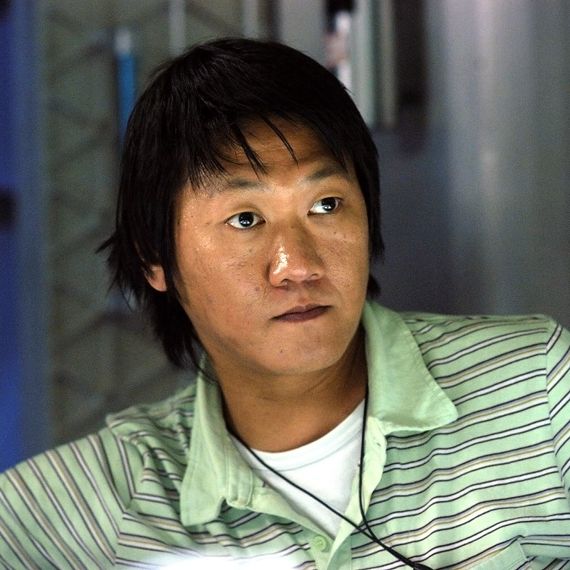
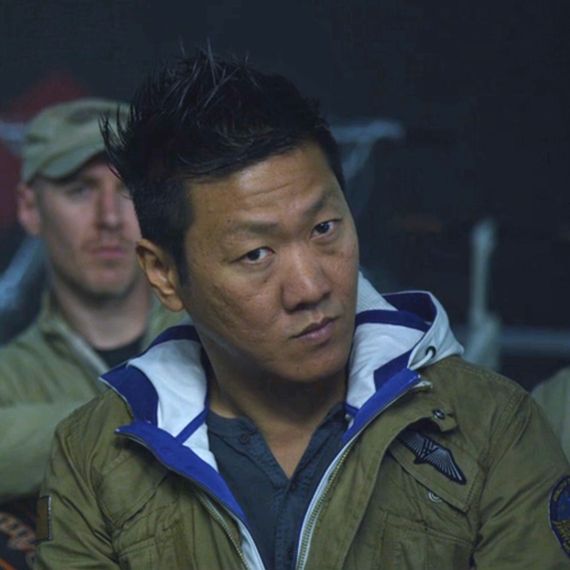
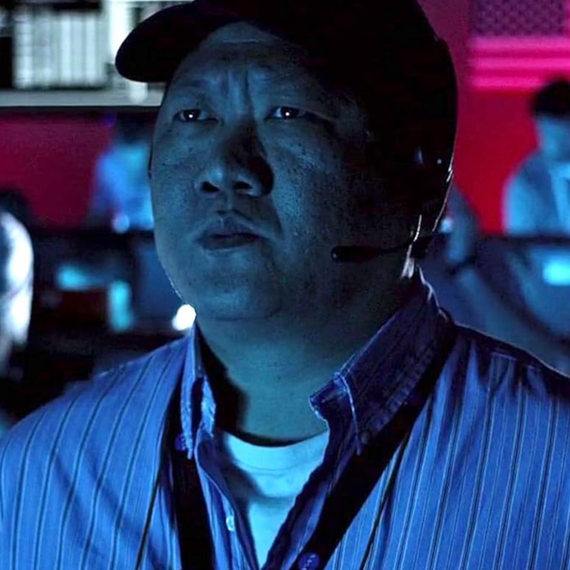
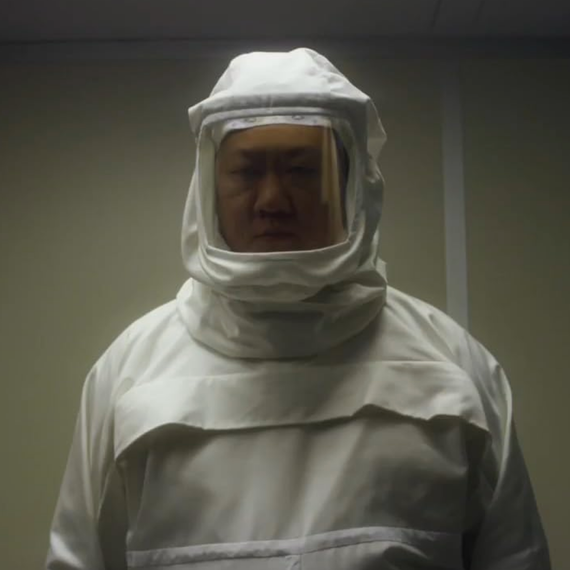
At what point did you start representing yourself as your own agent?
Ten years ago, I had exhausted everything. Three years in a cooperative. Ten years with a London agent, and then seven years with the agent I left to represent myself. You can kid yourself, being in these agencies with faces we all know. I’m in this pool, that’s fine. But if they’re only calling you when they need the Asian, they’re not really working for you.
Was it difficult to learn how to negotiate a contract? Have you ever unknowingly low-balled yourself on something?
Yeah, yeah. There was a BBC one, they were still offering what I got offered for the past ten years. I told them, “Look, I can’t do this.” I think because the lead had basically, for want of a better word, kind of taken all the others …
Oh, took the majority of the budget?
Basically. I did say, “Hey, look, I can’t do it.” Then I looked at the weekend and went, “Okay, I don’t have any money here. What have I done?” The next Monday, I called and went, “I’ve had a good think over the weekend, and I’ve had a change of heart.”
And you took the job?
Yeah, I took the job. At least you can fight the battles, can’t you? Well, the greatest one that came up after that was two leads. One was Ai Weiwei. The other one was Chimerica.
Were those among the first offers you got after you went on your own?
Yes. They overlapped by a week. Normally, an agent would see that as a direct clash and say, “You can pick one.” Now it’s Wong and Only Management. I said, “I’m going to do both, and you’re both going to have to work it out.” And I managed to convince them to move the dates.
Were you scared?
No. I didn’t care anymore. It was almost like my career was in tatters: Either I’m coming to the end or I fight for it. Both of these roles were amazing, and I wanted to do both. They allowed the space for me to do it. Essentially, I created my own repertory: I would rehearse in the daytime and then I’d be on at night doing a play. I hardly had any time, I had one day off. I felt like a proper artist, like “I’m just the actor I wanted to be.”
I proved to myself that I could be a lead. The other play, Chimerica, won five Olivier Awards. Then I got Kublai Khan. But they were always going to come to me anyway. Again, “the Asian role.”
Marco Polo was this huge opportunity. It was Netflix’s first big prestige play, as expensive as Game of Thrones according to some reports. You’d be seen by millions of people around the world. Did you have any feelings about being typecast as Kublai Khan?
I don’t know if I was being typecast. I think it was a role of a lifetime. It had all those Asian elements: what we understand as family, how he’s never felt good enough because of his grandfather. And yet, he was the first global world-trade leader. I wish that they’d called it Silk Road or something, because that would encapsulate a fifth of the landmass of the world. Then we could have incorporated Middle Eastern stories, all through this hand that had this grip. But such is where the gaze lies. That was ten years ago, though, and we’re shifting slightly now.
Look at something like Black Panther: You’ve got an entire lineage of people that are passionate to tell their story culturally. You look at Sanada-san and what he’s done with Shōgun. Now that’s a story being told.
Well, at the same time, it has to align with the people with the money, and they tend to be white.
Now that’s a whole question. I don’t know who the funders of Shōgun are, but all I see is the creative departments from top to bottom interested in the minutiae: how they want things to be told, how they want things to be worn. That’s when we’re really entering a golden era for us all, to be fully seen on and off the screen.
I wonder about the tension, because I feel this sometimes: There are things you’re uniquely able to do because you’re Asian, right? But sometimes folks in our position don’t want to take certain jobs because we don’t necessarily want to be seen as just the race. To what extent have you struggled with that over the course of your career?
Massively, massively.
Do you think there are better roles for Asian actors these days than ever before?
I can only speak for myself. Are things better for Asian actors? I mean, things like Warrior have been amazing. I’m good friends with Andrew Koji. All those positive Asian roles, and also a glimpse into what was going on during that period, the Gold Rush, when there were signs saying, “No dogs and Asians.” Things like Everything Everywhere All at Once. I see all these as shared wins, you know?
I’m hatching plans for a production company. Maybe I can start to green-light films now. It’s time to create your playground, and invite people to play.
Do you mentor other actors?
Yeah, I do. A handful of East Asian actors. Because I’ve been in the jungle just hacking away and there was no one really to look up to. I always open the door. If anyone ever needs any advice, they can slide in the DMs and I’ll have a conversation.
Anybody we’d know?
Jess Henwick, back in the day. She doesn’t need me at all, mate. She’s off and away. She’s fantastic.
I need to pay tribute to a wonderful actor, Tim Pigott-Smith, who sadly passed. He properly looked after me. When I played Ai Weiwei ten years ago, he sent me a lovely postcard with, “Your country needs you” — I don’t know if you’ve seen those old war posters. He’d been watching my progress.
It’s important to see the young. I try to do one-on-ones with people and see structurally where they are and say, “Okay, well, this is your next move.” Also, be realistic and don’t let them go, “Oh, I want your path.” No, you’re not going to have that, because that’s mine. You are going to make your own journey. You’ve got other actors the same age as me who totally despise what I’m doing because they think I’ve got their career. That’s because of the scarcity, but also, that’s the system, isn’t it?
Without an agent, how do you book a role now?
People come to me. When you are not in an agency, you go back into the Spotlight. It’s a directory for actors. Anyone can find any actor. Then the Spotlight will send you a text, an email, saying, “Such and such wants to see you for a play.”
So you don’t audition much any more?
It’s normally like a Zoom chat. There were a few dalliances with other agents here and there, but they all got the Gollum eyes for the Marvel contract. Basically, I signed my own Marvel contract, and that is a credit to me as an agent. That isn’t anyone else’s but mine.
Obviously, I signed my own Marvel deal, I signed this 3 Body Problem deal. It’s been quite baffling though, because I’ve been trying to pass my momentum over to a new agent —
To somebody else to rep you again?
Yeah, to a big agency. But they all peer over at your existing deals. I’m like, “Don’t worry about those. Those are what I did as an agent. I need more.”
I can’t wrap my head around what it’s like to negotiate for yourself against a behemoth like Marvel and Netflix. It’s got to be really scary when you’re in the room. What’s the process like?
Fundamentally, it’s about understanding your worth, isn’t it? That is a form of negotiation. What I find interesting now is that I don’t have an agent who has their own personal agenda for me to take a job. For me, I’m either going to do it or I’m not going to do it.
I have to shout-out my lawyer, Bob Wallerstein. He is utterly fearless. I don’t like to call him my lawyer first; he’s my friend who happens to be my lawyer. I met him through my friend Chiwetel Ejiofor. We were doing The Martian with Ridley Scott and we’re having lunch and messing about, prying, “What’s your next gig?” He’s doing Dr. Strange. Then I go online and I see this character Wong, and I cannot believe there’s this character. I say to him, and I’m not joking, I said, “Mate, I’m doing a petition and it’s called Wong for Wong. You sign it, Cumberbatch signs it.” This is my Salford kind of negotiation, the path of least resistance. To which he says, and quite rightly so, “Look, I’ve jumped through many, many hoops. I don’t know if it’s a good idea.” So it dies.
Then I start filming Marco Polo and I get this mystery email from Disney saying, “We’d like you to audition for the role of Lee.” Now, you and I both know that Wong and Lee is Smith and Jones for Asian people. You ain’t kidding no one. I make audition tapes, and by the time I hit Malaysia filming Marco Polo, I get a call from Sarah Finn who says, “Congratulations, you’re going to have an amazing time.” Then I calmly text Chiwetel, “I think I’m going to need to borrow your lawyer?” And Chiwetel sent, “Wong for Wong?” And I replied back, “Wong is Wong.” And I was dressed as Kublai Khan, sat on a throne, looking at everybody knowing that I couldn’t tell anyone.
How was the adjustment to acting in front of a green screen all the time?
There hasn’t been that much for me. I’m just staring into the middle distance. There’ll be the odd tennis ball, some spaceships, moving wind.
Do you have to work out to prep for those scenes?
Not for me. When I got the role, I had absolutely zero prep time. I had one day, dropped my bags off, and went straight to work with the size of Kublai Khan.
Wong is essentially the connective tissue binding together Phase Five of the MCU, but he hasn’t had the opportunity for a fleshed-out story for himself. Have there been discussions about a more prominent role for Wong in the canon? What’s your read on his place in the MCU at this point?
Previously, they needed to finish off all the stories with Iron Man and Captain America. I was very pleased to be a part of, you know, “Have portal, will travel.” I’m happy to go wherever they want to go with this character. There’s no denying he’s got some level of popularity. There is much more scope they could lean into. The very fact that they’ve made Wong Sorcerer Supreme only says where we could go now.
So you’re hoping that there could be a standalone TV show or movie for Wong?
I don’t know. With Marvel, they’ve kind of gone, “Okay, we’ve given you the keys to all the dimensions.” I was like, “Okay, well then possibilities are obviously endless.” So I shall see what the universe aligns me with, and leave that to them. In the meantime, I get to play in this other world with 3 Body Problem.
How did you meet David Benioff, D.B. Weiss, and Alexander Woo? Were you friendly with them before working on this project?
No. I had met them when I got the call from Robert Sterne and Nina Gold saying, “Benioff and Weiss and Alexander Woo want to meet you.” I was filming Dr. Strange in the Multiverse Madness. I was like, “Hang on, hang on. Okay.” Intake of breath. I was like, “Is it a good part?” And they’re like, “I can’t say anything.” And I’m going, “Yeah, but is it a good part?” And then their tone went, “It’s a good part.”
So they sent me this character breakdown and I went, “Okay, his parents came over in the ’70s to Manchester and he’s born, lived there for about 20 odd years, moved to London.” I met them on Zoom and I went, “This character breakdown sounds a lot like me.” And then Alexander was like, “Ah, yeah, well, we copied your Wikipedia page.” That was it. I’m like, “Oh, okay. This is known as a shoo-in.” They said, “Look, when we were doing Game of Thrones, there were two people we knew we needed to get, and that was Peter Dinklage and Sean Bean. With this, there’s one, and it’s you.” It’s funny, isn’t it? You’re trying to be cool. I said, “Okay,” and that was it. It’s taken three American showrunners to embrace you as being from Salford, Manchester, being from the north, and give you a fully fleshed, complex character.
Now, I’ve got the opportunity to play the person who I am authentically. Sometimes you have to wait 30 years for something. It can mess with your head a bit. Now people are like, “Oh, I didn’t know you’re from England.” Or, “I thought you were American.” I love that. I love to keep them guessing.
There’s a scene in 3 Body Problem that captures what you do particularly well. Clarence is watching his son play Mortal Kombat, and he’s just sitting, mulling things over. Your characters often look like they’re always stewing over something. You do this as Wong in the Marvel movies, though with an edge of judgment, particularly around Dr. Strange. Kublai Khan, huge stewer in the face. It feels like your characters try to keep a strong distance between what he’s thinking and how he’s coming across. Is that a conscious choice?
I just play the actions within the scene. We see that he takes his job home with him: He’s quickly eating something, he’s making small talk. He’s world-weary, and he carries so much. He is the job, essentially. He looks into his son and it’s all kind of insignificant.
I always just play the action. It’s almost like I’m moving within it, and then I allow people to be subjective about how they view him. What are you seeing? No, literally. I’m asking you.
The thing that’s interesting about Shi is that he doesn’t seem particularly stricken with existential dread by the prospect of invading aliens. He keeps his eye on the bigger picture. He accepts this place in the machine.
Yes. People like him are unflappable.
Do you take your characters home with you?
I do keep thinking about the world of that character, yeah. When I was researching counterterrorism, I happened upon someone who was from that world, and they were a great source of information for me. Da Shi, he’s his job, and what is this job? Intelligence operative. I say, “Well, what is an intelligence operative? What do they do?” He’s like, “They find their mark and they never lose them. They have all devices charged. They’ve got terrible eating habits. Nutrition is out of the window.”
Even with Kublai Khan, it’s like, “Why am I the most powerful man in the largest slice of landmass of the world? Because I’ve got these soldiers around me. Because I’ve got this fortress around me. Because someone fears when they hear my name.” That’s what embodies me. And I just sit there, just relax.
So when you go home from playing Kublai Khan, you don’t walk into your house feeling imperious or anything?
Well, occasionally. Probably got told off for not saying please or thank you for a while.
Do your kids want to be actors too?
No!
What are they into?
Legos, yeah. Their daddy’s a Lego figure. I was part of a Lego superhero advent calendar. I was really chuffed.
Are you parents still around?
My dad is, yeah.
I assume he could be considered proud of you at this point?
Oh, when I played Kublai Khan, that’s when he really broke. “I knew you were going to rule the world!” That basically trumped the lawyer and the medic.
More Conversations
- David Lynch on His Memoir Room to Dream and Clues to His Films
- Willem Dafoe on the Art of Surrender
- Emily Watson: ‘I’m Blessed With a Readable Face’



